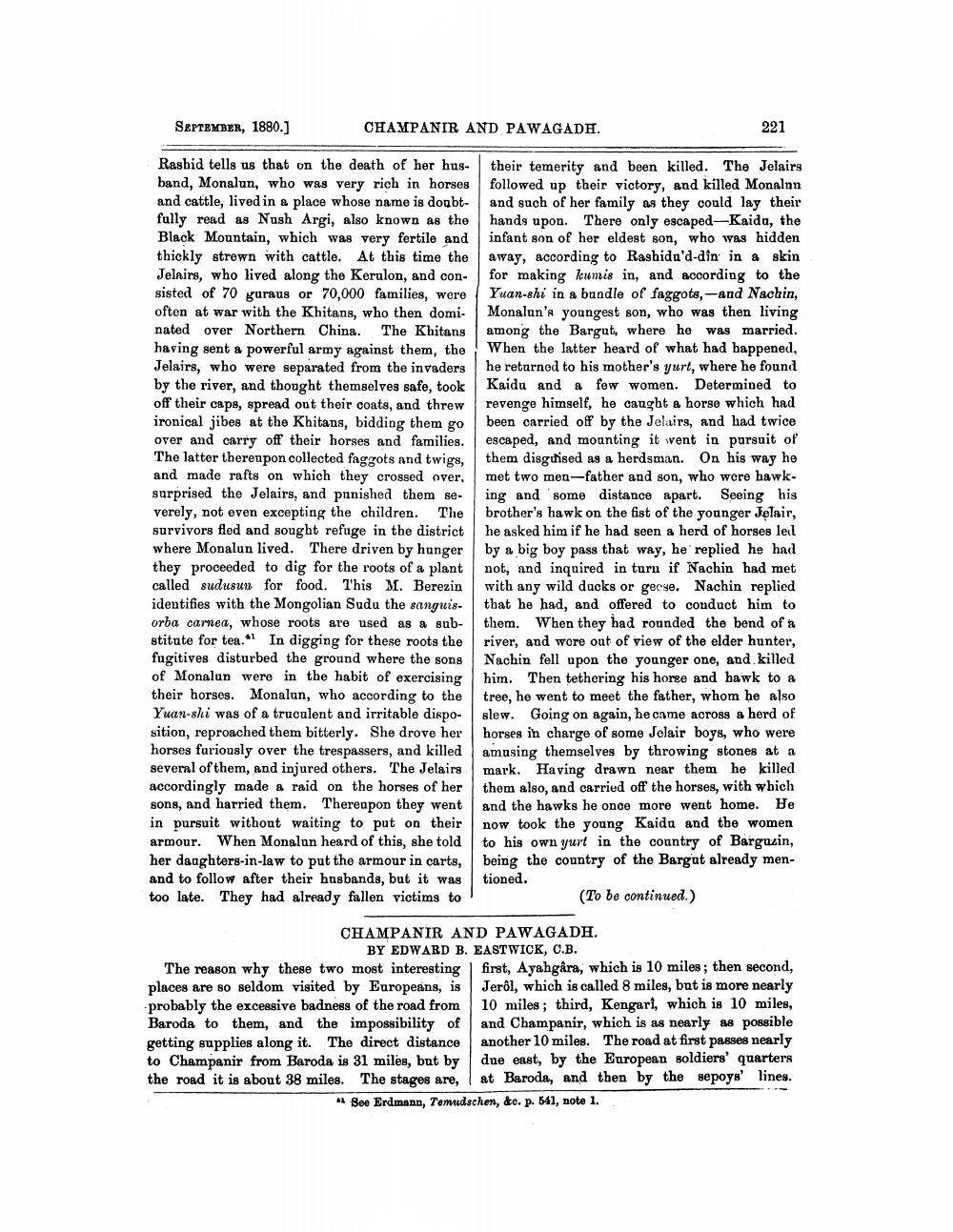________________
SEPTEMBER, 1880.)
CHAMPANIR AND PAWAGADH.
221
Rashid tells us that on the death of her hus their temerity and been killed. The Jelairs band, Monalun, who was very rich in horses followed up their victory, and killed Monalan and cattle, lived in a place whose name is doubt- and such of her family as they could lay their fully read as Nush Argi, also known as the hands upon. There only escaped-Kaida, the Black Mountain, which was very fertile and infant son of her eldest son, who was hidden thickly strewn with cattle. At this time the away, according to Rashida'd-din in a skin Jelairs, who lived along the Kerulon, and con- for making lumis in, and according to the sisted of 70 guraus or 70,000 families, were Yuan-shi in a bundle of faggots, -and Nachin, often at war with the Khitans, who then domi- | Monalun's youngest son, who was then living nated over Northern China. The Khitans among the Bargut, where he was married. having sent a powerful army against them, the When the latter heard of what had happened, Jelairs, who were separated from the invaders he returned to his mother's yurt, where he found by the river, and thought themselves safe, took Kaidu and a few women. Determined to off their caps, spread out their coats, and threw revenge himself, he caught a horse which had ironical jibes at the Khitans, bidding them go been carried off by the Jelairs, and had twice over and carry off their horses and families. escaped, and mounting it went in pursuit of The latter thereupon collected faggots and twigs, them disguised as a herdsman. On his way he and made rafts on which they crossed over, met two men-father and son, who were hawksurprised the Jelairs, and punished them se- ing and some distance apart. Seeing his verely, not even excepting the children. The brother's hawk on the fist of the younger Jelair, survivors fled and sought refuge in the district he asked him if he had seen a herd of horses leil where Monalun lived. There driven by hunger by a big boy pass that way, he replied he had they proceeded to dig for the roots of a plant not, and inquired in turn if Nachin had met called sudusun for food. This M. Berezin with any wild ducks or gecse. Nachin replied identifies with the Mongolian Sudu the sanguis- that he had, and offered to conduct him to orba carnea, whose roots are used as a sub- them. When they had rounded the bend of a stitute for tea." In digging for these roots the river, and wore out of view of the elder hunter, fugitives disturbed the ground where the song Nachin fell upon the younger one, and killed of Monalun were in the habit of exercising him. Then tethering his horse and hawk to a their horses. Monalun, who according to the tree, he went to meet the father, whom he also Yuan-shi was of a truculent and irritable dispo- slew. Going on again, he came across a herd of sition, reproached them bitterly. She drove her horses in charge of some Jelair boys, who were horses furiously over the trespassers, and killed | amusing themselves by throwing stones at a several of them, and injured others. The Jelairs mark. Having drawn near them he killed accordingly made a raid on the horses of her them also, and carried off the horses, with which sons, and harried them. Thereupon they went and the hawks he once more went home. He in pursuit without waiting to put on their now took the young Kaidu and the women armour. When Monalan heard of this, she told to his own yurt in the country of Barguzin, her daughters-in-law to put the armour in carts, being the country of the Bargut already menand to follow after their husbands, but it was tioned. too late. They had already fallen victims to
(To be continued.)
CHAMPANIR AND PAWAGADH.
BY EDWARD B. EASTWICK, C.B. The reason why these two most interesting first, Ayahgåra, which is 10 miles; then second, places are so seldom visited by Europeans, is Jerôl, which is called 8 miles, but is more nearly probably the excessive badness of the road from 10 miles; third, Kengari, which is 10 miles Baroda to them, and the impossibility of and Champanir, which is as nearly as possible getting supplies along it. The direct distance another 10 miles. The road at first passes nearly to Champanir from Baroda is 31 miles, but by due east, by the European soldiers' quarters the road it is about 38 miles. The stages are, at Baroda, and then by the sepoys' lines.
* Soo Erdmann, Temudschen, &c. p. 541, note 1.




